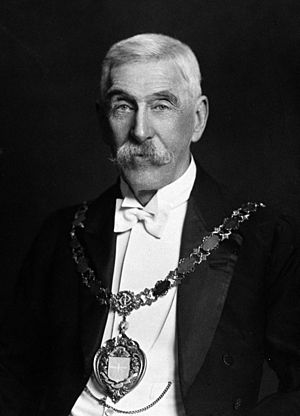Leonard Rogers facts for kids
Quick facts for kids
Sir Leonard Rogers
|
|
|---|---|

Sir Leonard Rogers
|
|
| Born | 18 January 1868 |
| Died | 16 September 1962 Royal Cornwall Infirmary, Truro, Cornwall, England
|
| Nationality | English |
| Known for | Founding the Royal Society of Tropical Medicine and Hygiene |
| Spouse(s) | Una Elsie North |
| Children | 3 sons |
| Awards | Companion of the Order of the Indian Empire (1914) Fellow of the Royal Society Cameron Prize for Therapeutics of the University of Edinburgh (1929) Knight Commander of the Order of the Star of India (1932) Manson Medal (1938) |
| Scientific career | |
| Fields | Tropical medicine |
Sir Leonard Rogers KCSI CIE FRS FRCP FRCS (born January 18, 1868 – died September 16, 1962) was a very important British doctor. He was a pioneer in tropical medicine. This means he studied and treated diseases common in hot, tropical countries. He helped start the Royal Society of Tropical Medicine and Hygiene and was its president for a few years.
A Life in Medicine
Sir Leonard Rogers was interested in many different areas of tropical medicine. He studied outbreaks of a disease called kala-azar, which is a serious illness spread by sandflies. He also researched the poison from sea snakes.
One of his most famous achievements was finding a new way to treat cholera. Cholera is a severe disease that causes extreme dehydration. Sir Leonard Rogers pioneered using a special salty water solution, called hypertonic saline, to treat patients. This treatment has saved countless lives around the world.
He also strongly supported using chaulmoogra oil from India to treat Hansen's disease, also known as leprosy. This was an important step in finding effective treatments for this condition.
Building Medical Schools
Sir Leonard Rogers was one of the key people who helped set up the Calcutta School of Tropical Medicine (CSTM) in Calcutta, India. This school became a very important place for studying and teaching about tropical diseases.
In 1929, his hard work and discoveries were recognized. He received the Cameron Prize for Therapeutics of the University of Edinburgh. This award is given for important advances in medical treatments.
Sir Leonard Rogers also served as the president of the Indian Science Congress in 1919. This was a major meeting where scientists from India shared their research and ideas.
 | Laphonza Butler |
 | Daisy Bates |
 | Elizabeth Piper Ensley |

